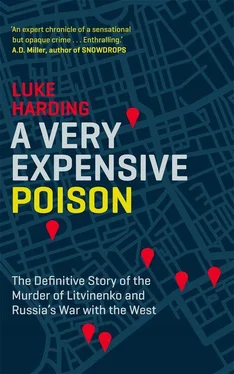Lugovoi and Kovtun spent two hours at Hey Jo’s, leaving at 3 a.m. Detectives were able to piece together where they’d been. They found traces of radiation in cubicle nine – on the backrest and cushions. There were low levels on a bench, a table in the restaurant, and on a door in the gents’. No polonium was found on the phallus, also tested. The floor was clean. Apparently the men from the KGB didn’t dance.
Even in these promising surroundings, their side-mission to pick up women was unfruitful. The next morning, checking out of the Parkes Hotel for the flight back to Moscow, Rondini asked Lugovoi how they had got on.
His reply was uncharacteristically honest. ‘We were not lucky that night,’ he told her.
* * *
Lugovoi’s conversations back in Moscow following his first unsuccessful attempt to poison Litvinenko can only be imagined. In short, he had failed. ‘Probably the chief yelled at them and said they weren’t good enough. It meant they had to go back and get another vial [of polonium],’ Goldfarb suggested.
The upshot was that within days Lugovoi returned to the UK, this time alone, taking with him another container of radioactive poison. He flew on 25 October from Moscow to London, on British Airways flight 875. He sat in business class, seat 6K. He arrived shortly after midnight at the Sheraton Park Lane, a grandly positioned hotel overlooking Piccadilly, with a frontage of black classical pillars. Inside, the hotel was rather worn. Lugovoi stayed in room 848, on the eighth floor.
After six years in Britain, Litvinenko was careful about security. He was akkuratny – a Russian word meaning neat, careful, punctual, exact, thorough. As a former FSB officer he practised good operational security. He didn’t discuss sensitive matters on the telephone. He told Quirke that he was concerned about London, describing it as such an open city and a place where people from Russia can come and do anything they want.
Despite these precautions and the litany of death threats in the past, Litvinenko trusted Lugovoi, who had now returned for a second time to kill him. Why?
For one thing, there was a sense of shared history. Both were ex-KGB. Both, seemingly, had spent time in Russian jails on false charges, victims of state injustice. In 2001, Lugovoi served eighteen months behind bars after apparently trying to free Berezovsky’s friend Nikolai Glushkov from jail. Glushkov was later released and fled to the UK in 2005. The Russian authorities had accused him and Berezovsky of embezzling funds from Aeroflot.
Glushkov was never convinced that Lugovoi actually went to prison. It’s an open question when precisely he began cooperating with the FSB. Some believe it was as early as 2001 at the time of his dubious ‘jailing’, and that the spy agency gave him a long-term mission to penetrate enemy circles in London. Others think that Lugovoi was forced to turn assassin after the Kremlin got hold of Litvinenko’s Ivanov report in the autumn of 2006.
Certainly other compatriots trusted Lugovoi. The morning after his return to London, Lugovoi set off in a chauffeur-driven Mercedes to an estate near Leatherhead, Surrey. His driver, Bruno Bonnetti, remembers him sitting on the back seat, talking in Russian on his mobile. They pulled up outside a palatial home; an iron security gate swung open. A tall man with a white moustache wearing a jogging suit, and in his early fifties, appeared. The man embraced Lugovoi. This was Badri Patarkatsishvili, the Georgian billionaire and associate of Berezovsky who had assisted in Litvinenko’s escape. Nearby, another chauffeur was washing the oligarch’s Maybach car.
Patarkatsishvili had hired Lugovoi in the 1990s to be head of security at his ORT TV channel. According to his friend Yuli Dubov, the Georgian later loaned Lugovoi $7 million. Generally speaking, the tycoon thought that ex-FSB officers made bad businessmen. Nonetheless, Patarkatsishvili told police that Lugovoi was a nice bloke, hard-working, a good employee. Lugovoi and Patarkatsishvili talked for some hours, sitting at the bottom of the garden in the gazebo. Lugovoi tried to persuade Patarkatsishvili to come in as an investor in a new water business. He declined.
‘Badri never liked slaves,’ Dubov said, reflecting on Lugovoi’s charm. ‘Lugovoi was a very good guy, nicelooking and nice-talking. He gave the impression of being absolutely on the level, straightforward, one of us.’
Undoubtedly, Patarkatsishvili thought more favourably of Lugovoi than he did of Litvinenko – someone, in his view, ‘who had crazy ideas about Russian politics’ and who was ‘obsessed by the FSB’, as a result of his unhappy career. The police later impounded Lugovoi’s radioactive Mercedes.
On his return from Surrey, Lugovoi met Litvinenko in his hotel. They sat in the ground-floor Palm Court, an afternoon tea room furnished in high art deco style, with Chinese screen paintings, vases and lamps. Litvinenko produced two Orange SIM cards so that he and Lugovoi had a secure way of communicating. As ever, Litvinenko drank tea, from a silver teapot. Lugovoi ordered three glasses of red wine and a Cuban cigar.
According to Lugovoi, Litvinenko revealed here that he worked for Spanish intelligence. He suggested that Lugovoi accompany him the next month on a joint trip to Spain. In Madrid they’d meet Litvinenko’s Russian-speaking Spanish handler, Jorge. It’s unclear if Litvinenko was acting under MI6’s direction here or simply wanted to present Lugovoi to his Spanish contacts as a useful Moscow-based source.
Litvinenko also had another important appointment. He was due on 8 November to meet Grinda, the Spanish public prosecutor. It would be their first encounter. All Litvinenko’s previous dealings had been with the Spanish secret service, which fed evidence to his prosecutors.
For Litvinenko, this was a serious escalation in his war with the Kremlin. It meant he was willing to testify in open court about the activities of the Russian mafia – and its friends in government. It’s unclear when Lugovoi learned of the planned meeting. According to Goldfarb, it may have triggered Moscow’s frantic efforts to kill Litvinenko, and to silence him as a witness. ‘That gives you a motive,’ Goldfarb said. Grinda was more circumspect, later saying he didn’t believe it was the cause.
Either way, this was the moment for Lugovoi to poison Litvinenko again. For unknown reasons, Lugovoi failed to deploy the latest vial of polonium he had brought. One possible explanation is that the Palm Court bar had video cameras, which Lugovoi would have seen. Or perhaps he suspected he was being watched. Did the British have him under counter-surveillance? (The answer – no.) It’s possible he had got fresh orders from Moscow. Either way, Lugovoi decided to abort the operation.
This left him with a problem: what to do with the poison?
Lugovoi’s solution was simple. In his hotel room he tipped the polonium away down the bathroom sink again, this time mopping it up with a couple of towels. He left the towels for the cleaner. And he appeared to have dumped the container in the white pedal bin next to the lavatory.
When scientists later tested Lugovoi’s hotel room on the eighth floor they walked into a scene from an atomic horror story. The door to Lugovoi’s room was highly contaminated. It showed full-scale deflection and a reading of more than 30,000 counts per second. Inside, there was further contamination – on the carpet, guest directory, and telephone book in a cupboard.
The situation in the bathroom, white-painted and with a tiled floor, was even worse. The inside of the pedal bin registered another full-scale deflection, with 30,000-plus. There was radiation everywhere: on the wall under the sink, the floor and bath, plus another massive reading from the bathroom door.
Читать дальше












